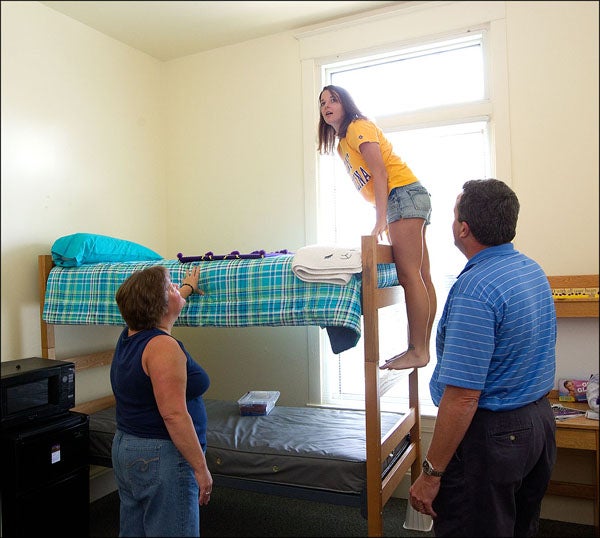SHARED EXPERIENCES
ECU institutes new policy on freshman residency
East Carolina University will require freshmen to live on campus their first two semesters under a new retention policy that begins in August. The policy is aimed at keeping students on the right track to return the following year.
“A lot of the research…states that students who live on campus, particularly their freshman year, do better academically,” said Dr. Virginia Hardy, vice chancellor for Student Affairs.
Hardy said Chancellor Steve Ballard’s Executive Council made the policy decision, with the Board of Trustees highly favoring the change.
Bill McCartney, associate vice chancellor for Campus Living and Dining, said the requirement will provide a universal first-year experience for incoming freshmen. It will allow students to be closer to the services the university provides and to bond with the university in a different way than they would if living off-campus.
Hardy said the greatest benefit of this change is increased programming geared specifically towards freshmen to help with the transition from high school to college.
“Those (programs) will cover developmental topics from how do you make friends, how do you deal with roommate issues, to time management, study skills and test taking skills,” she said.
“It helps with acclimation, from understanding how to study, how to perform, how to manage time a little bit, because there’s some structure within the residence hall.”
McCartney said that having this structure helps ease the transition and allows for students to focus more on studies. With that structure in place, he said, “All you have to do is worry about getting yourself up and getting to class and taking care of business.”
Incoming freshman Anna McDonald of Durham said although she would have preferred having the option to live off-campus, she is looking forward to living in the residence halls and making life-long friends.
“I think it’s a good idea for the first year just to get adjusted to college life on campus,” said McDonald.
Dovetailing with the new policy are the First Year Experience halls and Living Learning Communities offered by the residence halls. The First Year Experience is a social and academic integration program that eases the adjustment to college, said McCartney. Living Learning Communities join students with similar academic interests in a close residential environment, providing extended support, activities and networking with faculty and peers.
This year, business, biological sciences and pre-nursing have joined the list of available Living Learning Communities, bringing the total to eight options. Students may also choose engineering, honors, leadership, music and wellness.
Since about 85 percent of freshmen usually plan to live on campus, Campus Living does not expect a drastic increase in the number of residents. McCartney said there will be enough space to accommodate the extra percentage of freshmen, as well as any returning students who choose to live in the residence halls.
A few exceptions to the policy will be honored. Freshmen who live with their parents and commute less than 35 miles to campus may choose to live at home. Veterans, married students and students who are 21-years-old by the first day of classes may choose to live off-campus. McCartney said he expects the exceptions to affect only about 125 to 150 students.
ECU joins other universities that also require students to live on campus their first year, including UNC-Chapel Hill, Texas Tech and Duke University, which requires to students to live on campus the first three years.
“Students make friends for life during their freshmen year at college,” said McCartney.
“The people students live around and go through that rite of passage with as freshmen form a special bond…those students who live on campus have a much easier access to creating that bond and that common experience than off-campus students.
“Students who have that common experience will feel that much more connected to the institution,” McCartney said.
